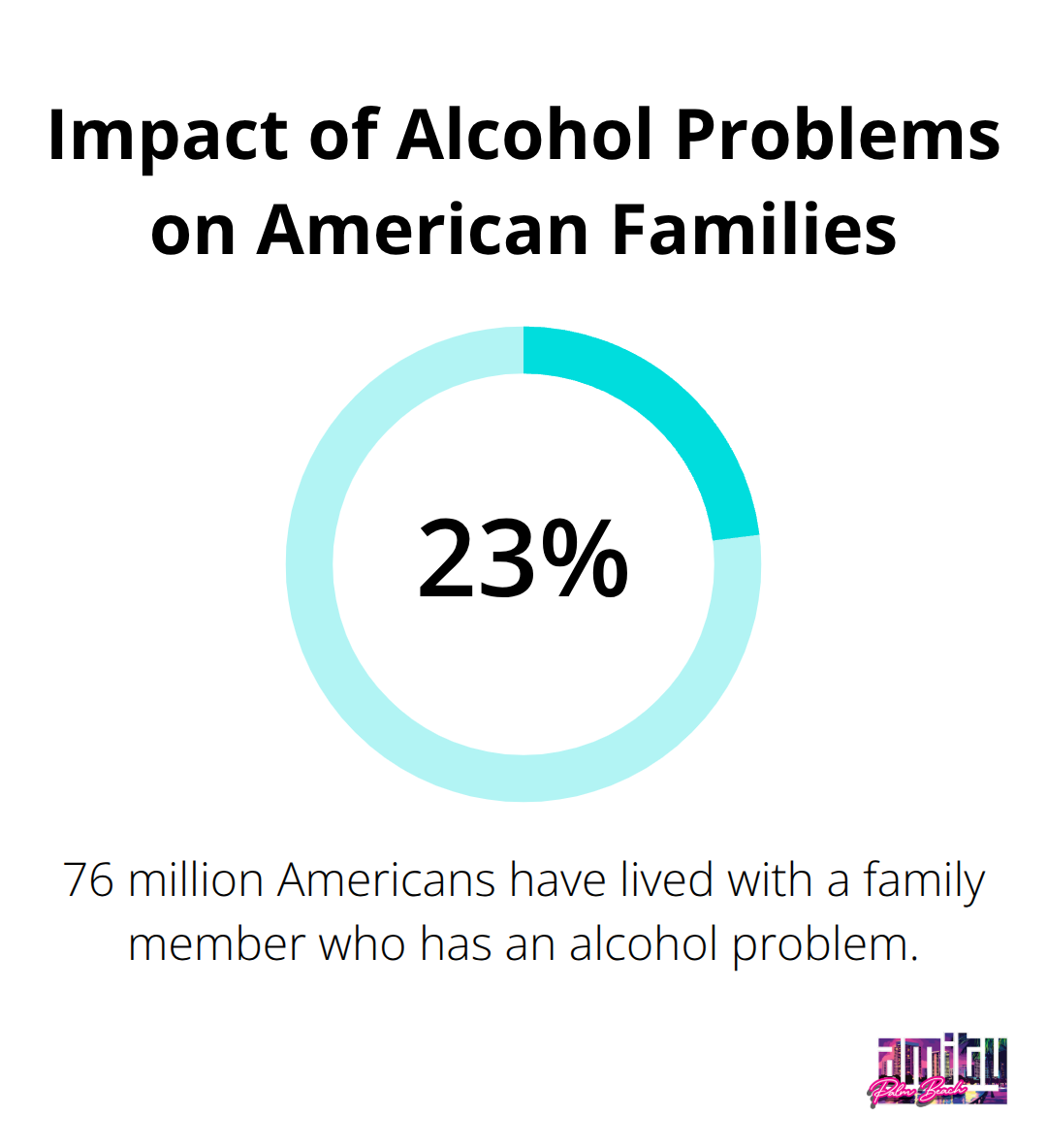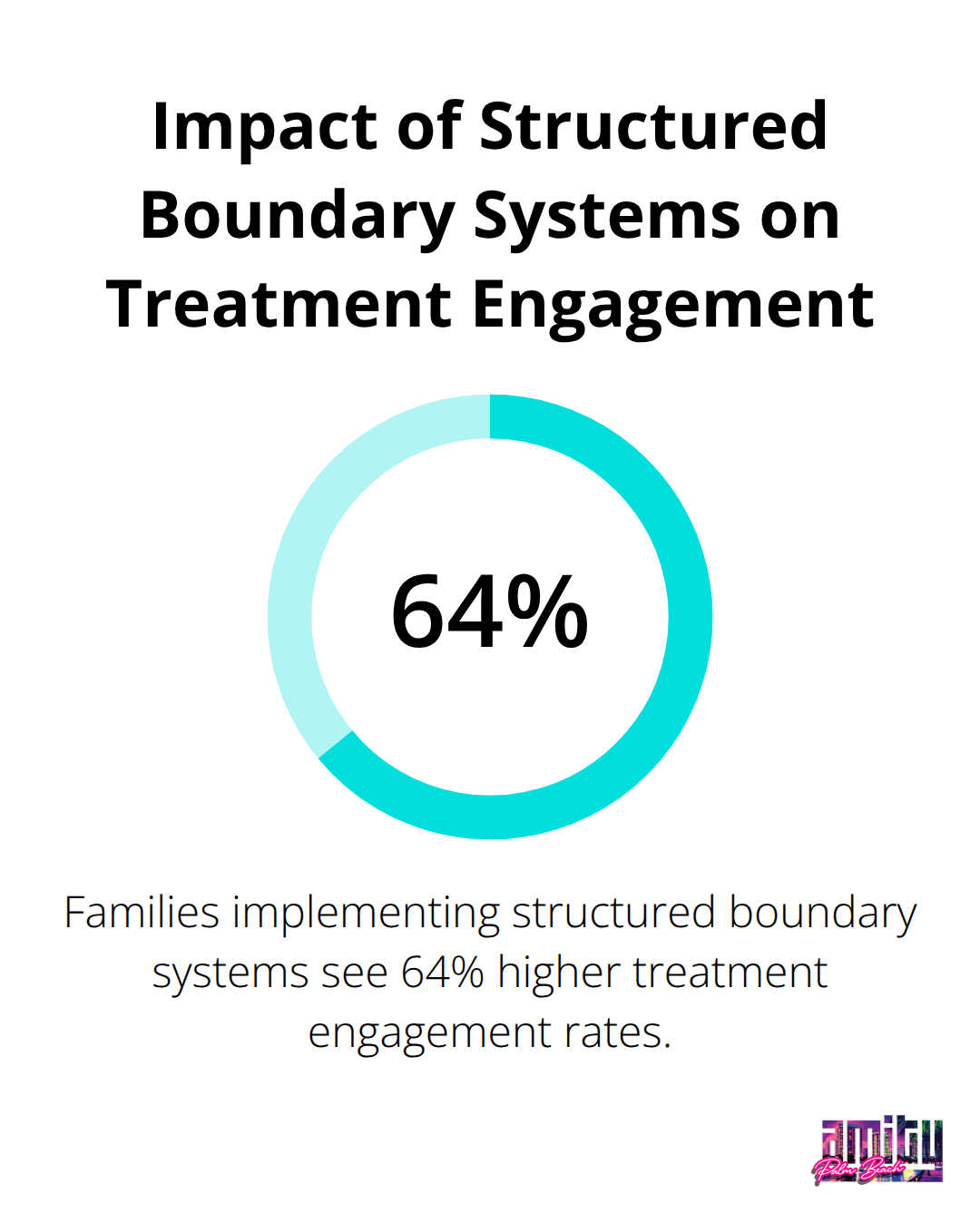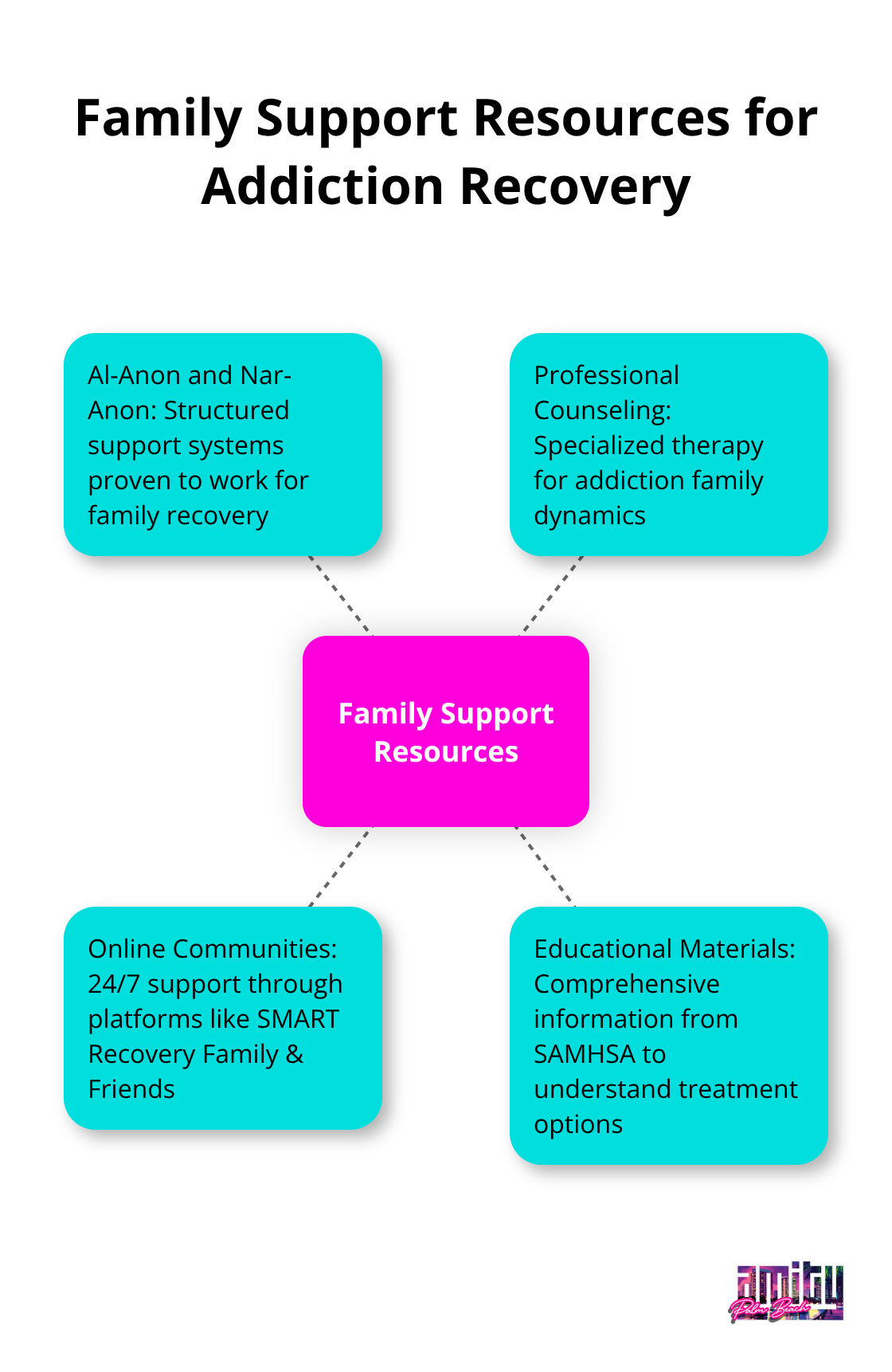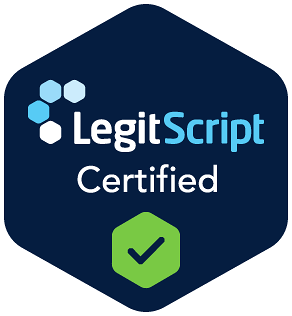Addiction affects entire family systems, not just the individual struggling with substance use. Research shows that 76 million Americans have lived with a family member who has an alcohol problem.

We at Amity Palm Beach understand that families for addiction recovery need specialized support and guidance. The path forward requires practical strategies, professional resources, and a commitment to healing together.
How Does Addiction Reshape Family Life?
Addiction transforms families into crisis management systems where normal routines disappear and emotional chaos becomes the new standard. Research from the National Institute on Drug Abuse shows that up to 90% of individuals with active addiction live at home with family members, which means entire households adapt around unpredictable behaviors, financial strain, and constant worry. The Federal Reserve’s economic well-being report found that one in five Americans personally knows someone affected by opioid addiction, which highlights how widespread these family disruptions have become.
Financial Devastation Hits Families Hard
Money problems emerge as one of the most immediate and devastating consequences for families who deal with addiction. Families frequently face job losses when the addicted member cannot maintain employment, while they simultaneously spend thousands on treatment attempts, legal fees, and property replacement. The National Survey on Drug Use and Health data reveals that families often exhaust savings accounts, max out credit cards, and even lose homes as they try to support their loved one’s recovery attempts. Many parents report that they spend their retirement funds or take second mortgages to pay for multiple treatment episodes (which creates long-term financial instability that affects the entire family’s future security).
Emotional Chaos Replaces Family Stability
Family members experience constant anxiety, fear, and hypervigilance as they never know what crisis will emerge next. Studies show that families affected by addiction report significantly higher rates of depression, anxiety disorders, and stress-related health problems compared to unaffected families. Children in these households often develop behavioral issues, academic problems, and struggle with trust in relationships. The emotional toll extends beyond immediate family members, as extended relatives, friends, and even neighbors become drawn into the chaos through requests for help, money, or emotional support.
Enabling Behaviors Trap Families in Destructive Cycles
Family members unknowingly fuel addiction through behaviors that seem helpful but actually prevent recovery. Common patterns include direct financial support, excuse-making to employers or friends, and repeatedly bailing the person out of legal or financial consequences. The Community Reinforcement and Family Training approach has identified that families who continue to provide financial support without accountability see significantly lower recovery rates. Instead of cash, families should pay directly for necessities like rent, groceries, or addiction treatment costs while they refuse to cover consequences of substance use (which forces accountability and natural consequences to occur).
These destructive patterns create the foundation for understanding why families need specialized support strategies and professional guidance to break free from cycles that inadvertently perpetuate addiction.
What Actions Actually Help Recovery
Families must replace destructive patterns with concrete actions that support recovery without enabling addiction. The Community Reinforcement and Family Training research demonstrates that families who implement structured boundary systems see 64% higher treatment engagement rates compared to those who continue financial support. Effective boundaries mean families refuse to provide cash while they offer to pay directly for addiction treatment, therapy sessions, or basic necessities like groceries. This approach forces natural consequences while families demonstrate care through actions rather than empty promises.

Transform Communication From Conflict to Connection
Communication strategies must shift from emotional reactions to structured conversations that promote accountability. Families should start conversations with specific observations rather than accusations. Instead of saying “you always lie about money,” try “I noticed the rent money is missing and I feel worried about our agreement.” This approach reduces defensive responses and creates space for honest dialogue about recovery progress and setbacks.
Set Financial Boundaries That Support Recovery
Money management becomes a powerful tool when families establish clear financial boundaries. Families should stop all direct cash transfers and instead pay vendors directly for essential services (rent, utilities, groceries, medical bills). This strategy prevents money from funding substance use while it maintains support for legitimate needs. These financial boundaries help prevent relapses while maintaining support for legitimate needs.
Professional Support Accelerates Family Healing
Family therapy and support groups provide essential frameworks that individual efforts cannot replicate. Families who participate in Al-Anon or similar programs experience lower stress levels and improved coping mechanisms. Professional family therapy addresses underlying dysfunction patterns while it teaches practical skills for crisis management. The SAMHSA National Helpline at 1-800-662-HELP connects families to local resources and evidence-based programs that have proven track records for recovery success.
These action-oriented strategies create the foundation families need, but they work best when combined with specific resources and professional programs designed for family recovery support.
Where Can Families Find Proven Support Resources

Al-Anon Delivers Results When Families Commit to the Process
Al-Anon and Nar-Anon provide structured support systems that research proves work for family recovery. Studies show that families who attend Al-Anon meetings consistently for six months experience improved mental health outcomes compared to those who rely solely on individual coping strategies. These programs teach specific techniques like detachment with love, which means families stop management of their loved one’s addiction while they maintain emotional connection. The 12-step framework provides practical tools for daily situations, including how to respond to manipulation tactics, financial requests, and crisis situations without enablement of destructive behaviors.
Professional Counseling Creates Breakthroughs Individual Efforts Cannot Achieve
Family therapy with addiction specialists produces measurably better outcomes than general counseling approaches. The Community Reinforcement and Family Training model shows higher treatment engagement when families work with professionals trained specifically in addiction family dynamics. These specialists teach concrete skills like crisis de-escalation, boundary enforcement, and communication techniques that prevent family arguments from escalation into relapses. Many insurance plans cover family therapy sessions, and the SAMHSA National Helpline connects families to local providers who specialize in addiction family work (which creates unified support systems that address both individual recovery and family healing simultaneously).
Online Communities Provide 24/7 Support When Crises Strike
Digital support platforms like SMART Recovery Family & Friends and online Al-Anon meetings offer immediate access to experienced families who understand addiction challenges. These communities provide real-time advice during crisis situations, share practical strategies for specific problems, and connect families to local resources in their geographic areas. The advantage of online support lies in accessibility during emergencies, holidays, or when transportation barriers prevent attendance at physical meetings.
Educational Materials Build Family Knowledge and Confidence
SAMHSA’s “What Is Substance Abuse Treatment? A Booklet for Families” provides comprehensive information that helps families understand addiction treatment options and recovery processes. The “Talk. They Hear You.” campaign offers specific tools for parents who need to discuss underage substance use with their children (which addresses prevention alongside recovery support). These educational resources help families move from confusion and fear to informed advocacy for their loved one’s recovery journey.
Final Thoughts
Recovery success depends on families who commit to long-term strategies that extend far beyond initial treatment completion. Research shows that families who maintain structured support systems for two years post-treatment see 73% higher sustained recovery rates. This means families must view recovery as a marathon process that requires consistent boundary maintenance, ongoing communication improvements, and professional support engagement.
Self-care becomes non-negotiable for family members who want to provide effective support without burnout. Studies indicate that family members who neglect their own mental health experience 40% higher rates of depression and anxiety. Families for addiction recovery must prioritize their own therapy, support group attendance, and stress management activities (which prevents caregiver fatigue while maintaining the emotional resources needed for long-term support).
Sustainable recovery environments require families to create structured daily routines, eliminate substance-related triggers from homes, and establish accountability systems that promote transparency. We at Amity Palm Beach work with families who understand that comprehensive addiction treatment must include family components that address underlying dysfunction patterns. These programs build new communication skills and relationship dynamics that support lasting recovery success.




